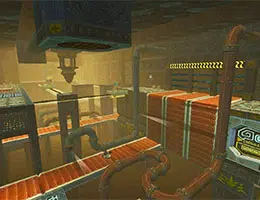 Classical Arabic maṭmūrah , which can be translated as “silo” , came to Hispanic Arabic as maṭmúra . That is the immediate etymological antecedent of dungeon , a term in our language that refers to an underground dungeon .
Classical Arabic maṭmūrah , which can be translated as “silo” , came to Hispanic Arabic as maṭmúra . That is the immediate etymological antecedent of dungeon , a term in our language that refers to an underground dungeon .
The dungeons, therefore, were located in places that were difficult to access , which increased the complexity of an eventual escape . They were usually built beneath a fortress or castle .
The physical location of the dungeon, on the other hand, made it a dark and gloomy place . He who was locked in a dungeon suffered great torments in addition to the deprivation of his freedom .
It was common for a dungeon to have a system of galleries and corridors to connect the different cells. In some cases, the remains of the condemned who died there were left in these prisons ; In this way the inmates lived with the bones of the deceased.
A dungeon game , on the other hand, is a type of adventure in video games , role-playing games and board games. In this entertainment, the player must navigate a labyrinth facing various enemies and collecting different elements that can be very useful to continue advancing.
The dungeon, in this framework, is an area of exploration . The character has to advance until he finds the exit and, in the meantime, he must eliminate the villains that appear in his path.
One of the most famous video game series in which the dungeon is the main element is The Legend of Zelda , created by the acclaimed Japanese designer Miyamoto Shigeru and published exclusively for Nintendo consoles, with the exception of three titles that were available in a Philips console from the mid-90s and not recognized as part of the official series .
The dungeons in Zelda games are very varied and challenging. They are generally distinguished by their thematic designs, which are usually related to the characteristics of the territory in which they are located; For example, a dungeon in the snow usually includes ice and cold as part of its logic, just as one located on a volcano usually has lava between its platforms .
 At the end of the dungeons there is always a particularly powerful enemy, which in the context of video games is called a "boss", whom the main character must defeat to exit and continue advancing in the story . On the other hand are the boss-like enemies encountered along the way; These present turning points in the adventure, since after defeating them it is common for the player to receive a weapon or artifact necessary to access new parts of the dungeon.
At the end of the dungeons there is always a particularly powerful enemy, which in the context of video games is called a "boss", whom the main character must defeat to exit and continue advancing in the story . On the other hand are the boss-like enemies encountered along the way; These present turning points in the adventure, since after defeating them it is common for the player to receive a weapon or artifact necessary to access new parts of the dungeon.
The feeling of confinement experienced inside a dungeon is accentuated by the omnipresence of death, by the dangers that constantly stalk us. This is true in both real and fictional ones, and serves as an incentive to keep going in search of the exit.
In the case of a video game, it is important to design it in such a way that the cells and corridors "speak for themselves", that they contain a series of messages that we can decode to understand how to advance. A good design never leads the player to frustration but invites them to carefully observe their surroundings. This balanced combination of challenge and mystery is very rare, since only great developers are able to achieve it.
It is important not to confuse dungeon with dungeon . This second concept has several meanings, usually referring to a food that is made with corn and that can be sweet or salty depending on the case.
